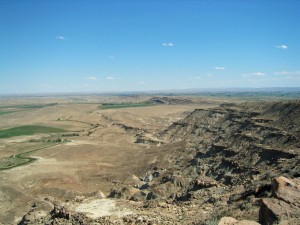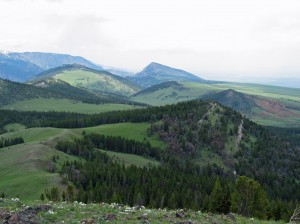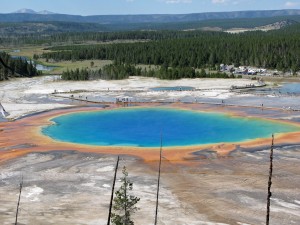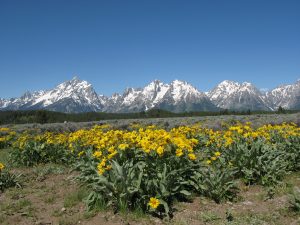Albion College Geology Field Camp
Albion College’s Geology Field Camp program will next be offered in Summer 2021.
2021 program details will be available Fall 2020.
Dates: TBA
Program Fee: TBA
Camp Information
Credit: 1.5 units (6 semester hours)
Enrollment: Limited to ~20 students. We anticipate that approximately 12-14 of these will be from schools other than Albion College. We accept for review applications from all qualified applicants (see course prerequisites below).
Course: Experience in geologic mapping is the main goal of the course. We focus on instruction of traditional field methods: mapping on topographic and aerial photo bases at a variety of scales is central to our instruction. We also introduce modern electronic techniques, such as GPS-assisted digital mapping. We illustrate the applicability of these tools to a variety of geological problems. Students also gain experience in taking detailed field notes, measuring stratigraphic sections, constructing geologic cross sections, deciphering geologic structures, and writing geologic reports.
We work with a wide variety of rock types and surficial deposits – including Precambrian schists, gneisses, and granites; Paleozoic, Mesozoic, and Cenozoic strata; Neogene volcanics; and Pleistocene glacial deposits. Our introductory mapping projects are in the starkly scenic Bighorn Basin and Wind River Basin. We then loop through western Wyoming to complete a surficial geology project along the flank of the Wind River Range and visit Grand Teton and Yellowstone National Parks. The stunning Tetons provide an opportunity to place the geology we work with in the broader context of the geology and tectonics of western North America. Field trip stops there are followed by additional stops in Yellowstone where we examine spectacular silicic volcanic features, geologic structures, and geomorphic landforms in addition to visiting landmark features such as Old Faithful. We then map a portion of the classic Heart Mountain structure, and associated Paleozoic stratigraphy and Absaroka volcanics east of Yellowstone. Our final mapping project is in central Wyoming, where students have the opportunity to map complexly deformed Paleozoic and Mesozoic strata and underlying Precambrian basement.
Prerequisites: Physical Geology, Structural Geology, Sedimentation and Stratigraphy, and Petrology (or their equivalents, or by permission of field camp director).
Fee: The program fee includes tuition, round trip transportation between Albion, MI, and field camp destinations, transportation during the course, and room and board (except for a few meals on days off and travel days).
For additional information, please contact us.
Field Locations

Bighorn Basin, WY

Near Pat O’Hara Mountain, WY

Yellowstone National Park, WY

Grand Teton National Park, WY
Faculty
William S. Bartels
Vertebrate paleontology and stratigraphy
Ph.D., University of Michigan, 1987
Bill has taught with Albion’s field camp since 1987 and has conducted field research in Wyoming since 1976.
Michael W. McRivette
Field Camp Director
Neo-tectonics, structural geology, and GIS
Ph.D., UCLA, 2011Mick has taught with Albion’s field camp since 2007. His research investigates active tectonic response of the Tibetan Plateau to Indo-Asian collision.
Carrie A. Menold
Metamorphic petrology and geochemistry
Ph.D., UCLA, 2006
Carrie has taught with Albion’s field camp since 2006. Her field area is in the northern Tibetan Plateau where she studies mountain building and crustal accretion.
Thomas I. Wilch
Herbert H. & Grace A. Dow Trustees' Professor in the Sciences
Ph.D., New Mexico Institute of Mining and Technology, 1997
Thom has taught with Albion’s field camp since 2001. Thom’s field area for his own research is in Antarctica.
Andrew Beck
Petrology, stratigraphy, and planetary geology
Ph.D., University of Tennessee, 2011
Andrew has taught with Albion’s field camp since 2017. He is a research scientist at Johns Hopkins University where he studies rocky, differentiated planetary bodies among other interests.
What to Bring
If you are considering bringing any items not appearing in the lists above, please contact us.
Field Equipment
- Day pack
- 2 field notebooks (approx. 5”x7”, small and sturdy type)
- Hand lens
- Rock hammer
- Pocket knife
- Well-broken-in hiking boots
- Sturdy belt
- Large clipboard or mapboard
- At least 2 one-liter water bottles
- Field hat, sunglasses, sunblock
- Bug repellent
- Small personal first aid kit, including Band-Aids, antiseptic cream, antacids, and over the counter pain medication (to keep in your day pack)
Office Supplies
- Pencils and good eraser
- Ballpoint pens
- Drafting pens and waterproof ink. These may be refillable Rapidograph-type pens (000, 00, and 1 point) or disposable ones like Pigma Micron pens (005, 01, and 05). If you choose the disposable pens, you should have at least two sets as they tend to not survive the duration of camp.
- Correction fluid
- Scotch tape
- Permanent markers (such as Sharpies)
- Calculator
- Several 6″ plastic rulers in metric and English and protractors. We recommend the combined clear plastic rulers and protractors for use in the field, and larger rulers and protractors for use in the office.
- Colored pencils
- Graph, tracing, and lined paper
- Optional: laptop computer (NOTE: We operate a mobile camp that requires significant travel between locations in fully-loaded vans, sometimes on rough roads. We cannot guarantee the safety of fragile equipment under these conditions. When possible, computers will be made available to students for the completion of assignments and personal use.)
Personal Gear
- Sturdy field clothes plus clothes for your time off (including a bathing suit). Long pants will be required in several field areas.
- Warm coat, gloves, hat, windbreaker
- Rain gear (jacket and pants). NOTE: Typically, ponchos and all-vinyl rain wear are not sturdy enough to survive the heavy use that may be required at camp.
- Eating utensils: fork, spoon, knife, mug, bowl (we will supply plates)
- Watch
- Alarm clock
- Sleeping bag and sleeping pad
- Towel
- Personal care products (soap, shampoo, toothbrush, toothpaste, etc.)
- Small headlamp or flashlight
- If you own one: Sturdy, waterproof tent capable of standing up in strong winds. (Space is available in Albion College tents for a fee of $20.)
- Money for meals on days off and on travel days to and from camp, and for any personal items you wish to buy
Optional
- Brunton compass. If you do not own one, please ask your department if it is possible to borrow one for field camp. We will provide a Brunton compass to any student who is not able to bring one.
- Personal electronic devices, such as a phone, and necessary chargers.
- If you take any prescription medicine, please make sure you have an adequate supply; out-of-state prescriptions may not be easily filled.
- If you wear eyeglasses, bring a spare pair if possible. If you wear contact lenses, it is a good idea to bring a pair of glasses as well, for dusty days.
- We have faced everything from subfreezing temperatures and snow to rain and hail to heat and drought. You should plan for all of these conditions as well, but please, try to pack light. You will be able to do laundry at least once a week. You must pack in soft-sided duffel bags (no hard-sided suitcases or external frame packs, and we would prefer no internal frame packs — these are easily damaged in the vans and make packing difficult).
- For your spending money, credit and debit cards are accepted nearly everywhere. To get cash, ATMs are common (personal checks are very difficult to cash). It will be impossible for us to get you to a Western Union office during business hours, so please don’t count on having money wired to you. The same is true for trips to banks. The best plan is to not run out of money, so please try to plan carefully. The main items for which you will need money are meals on days off and while traveling to and from camp, souvenirs, replacement supplies, and snacks.
What Not to Bring
- No boom boxes or speakers for personal players, computers, etc.
- No axes, hatchets, large knives, or firearms
- No camp cooking gear (stoves, fuel, pots/pans, etc.)
- No fireworks or other pyrotechnics
Useful Links for Geology Field Gear
Here are some links to vendors for geology field gear:
- ASC Scientific (hand lenses, notebooks, pouches, bruntons, hammers and more)
- Forestry Suppliers (hand lenses, variety of field notebooks, hammers, rulers etc.)
- Geology.com store (hand lenses, variety of field notebooks, hammers, rulers etc.)
- Plateau Design (very popular and sturdy field pouch)
- REI.com (good quality, reasonably priced camping, hiking, outdoor gear and clothing)
- Cabelas (good quality, reasonably priced camping, hiking, outdoor gear and clothing)
Contact Us
For further information, contact us via email at fieldcamp@albion.edu, or write to:
Albion Geology Field Camp
ATTN: Carol Caswell
Albion College
611 E. Porter Street
Albion, MI 49224